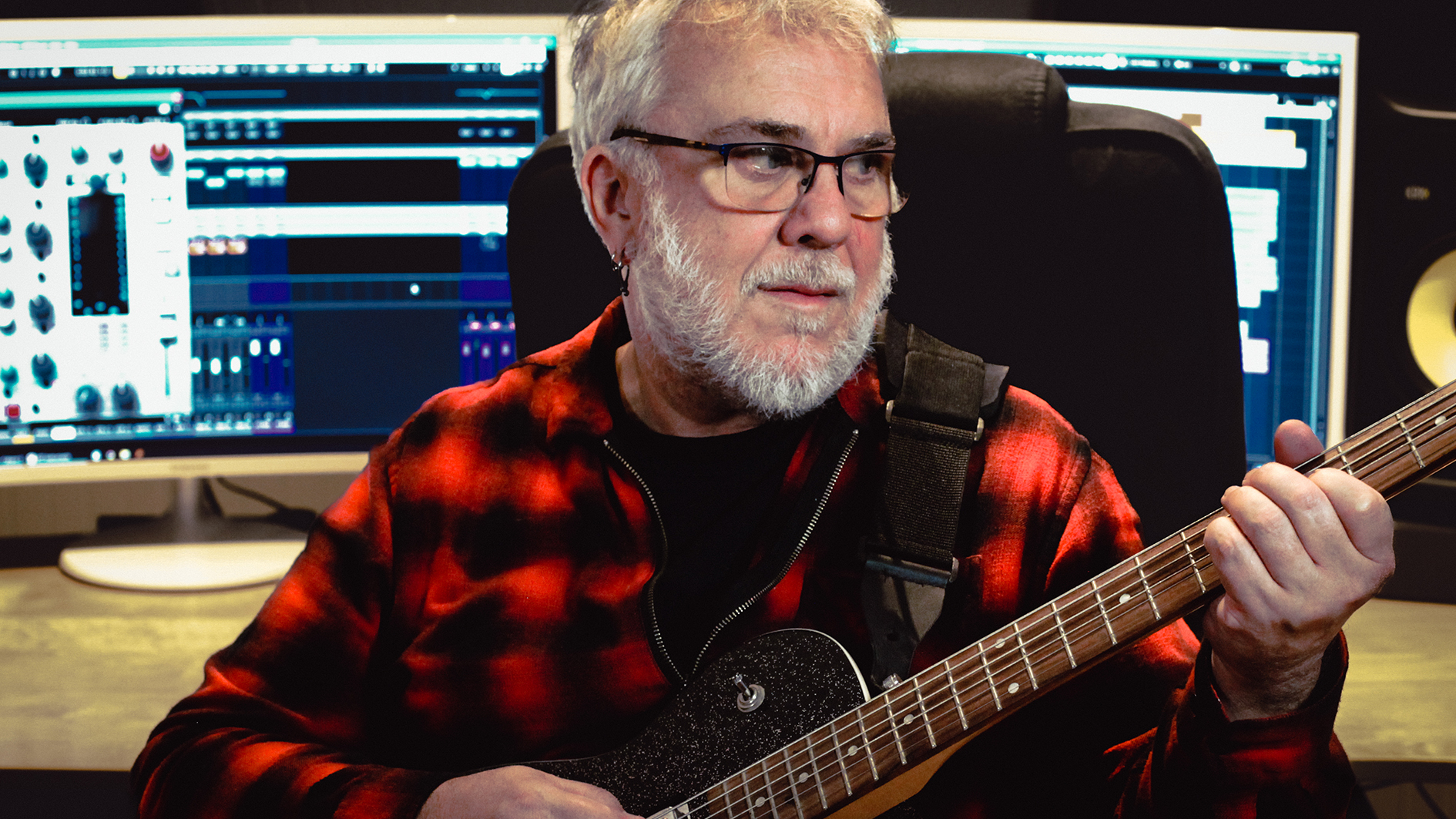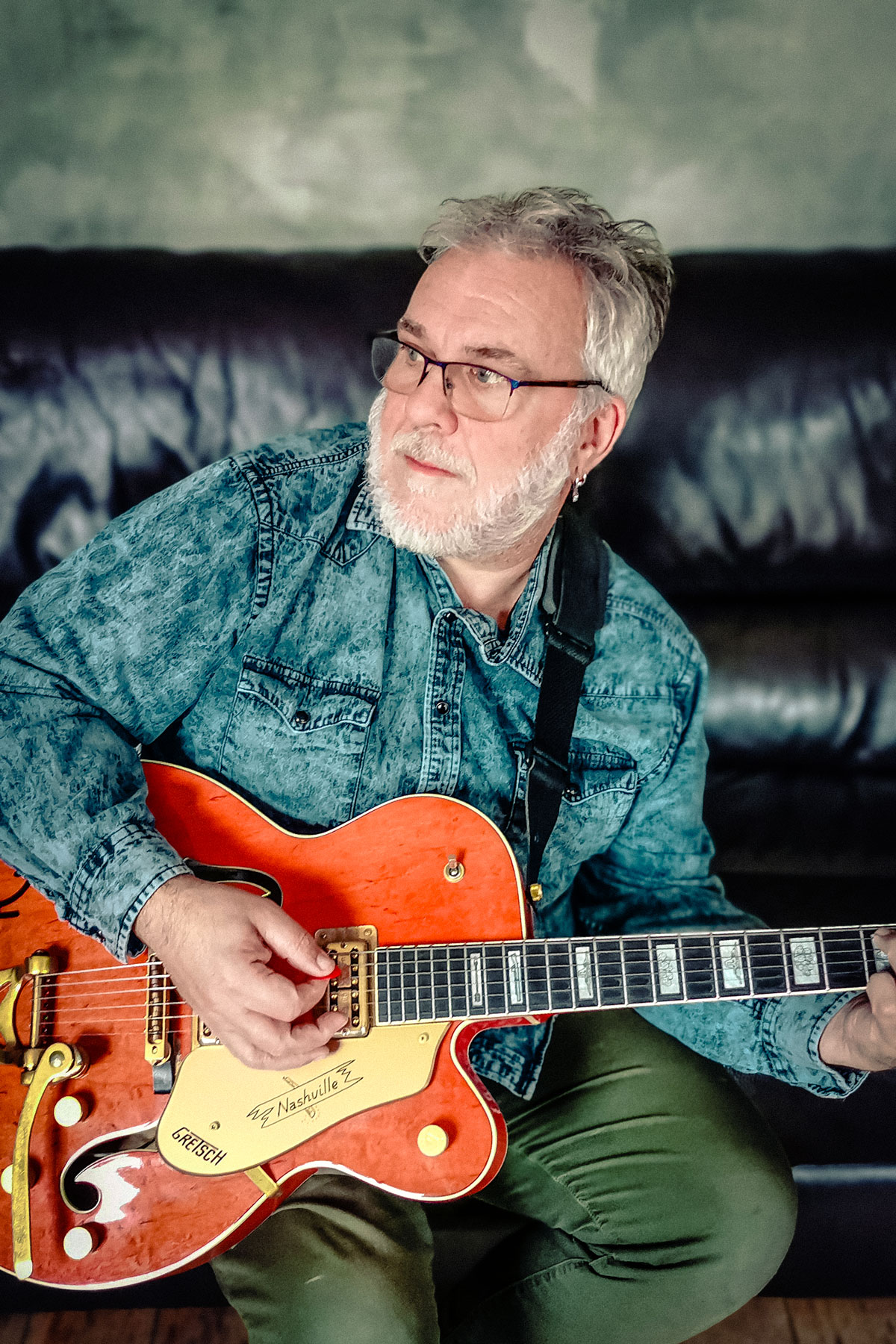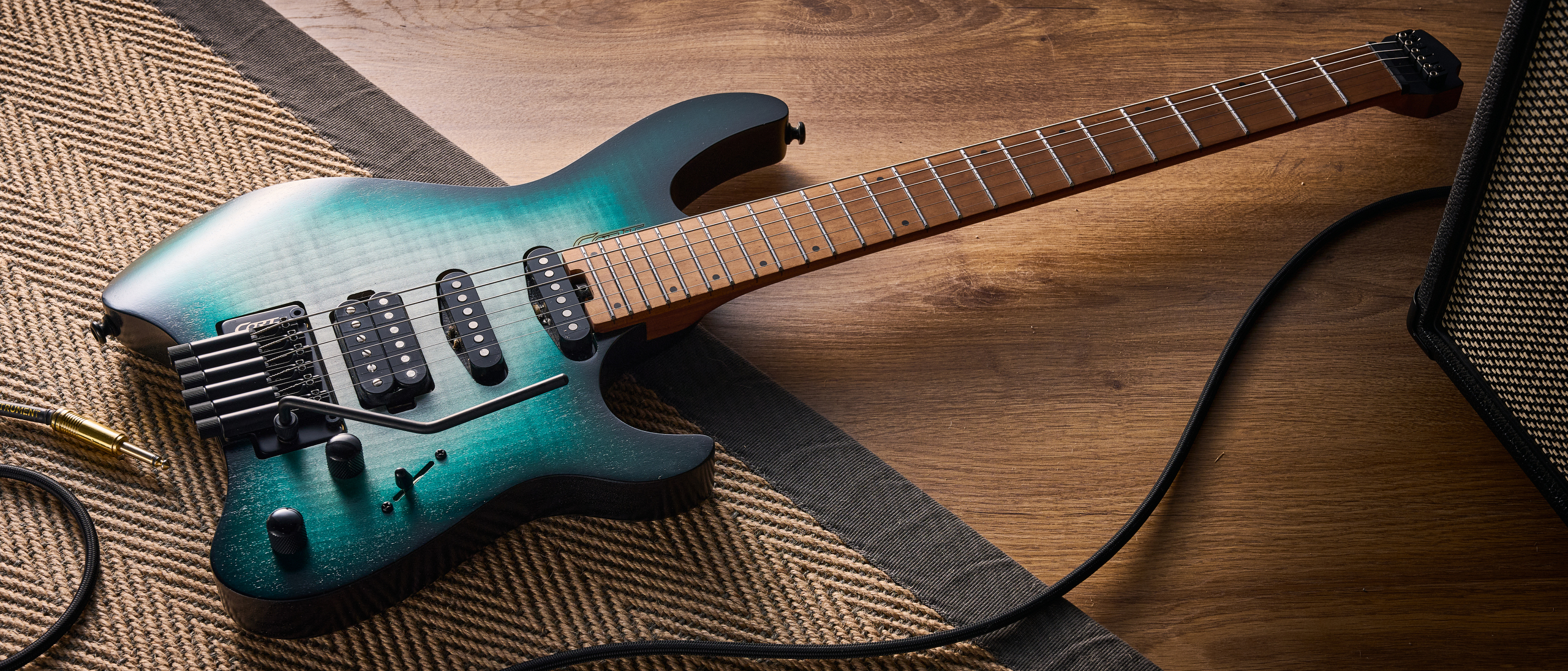Robin Guthrie: “I’m not playing a guitar – I'm playing the sound, I'm playing the pedals, I'm playing the reverb”
With a few stolen pedals and a drum machine, the former Cocteau Twins man helped reinvent guitar music. Now he’s back with a flurry of new releases…

All the latest guitar news, interviews, lessons, reviews, deals and more, direct to your inbox!
You are now subscribed
Your newsletter sign-up was successful
Robin Guthrie’s tonal wizardry has had a revolutionary impact on guitar music, but it’s his ears – not the gear – that have always led his approach to playing.
For over 40 years – from his days as the guitarist, songwriter and sonic architect behind UK indie icons Cocteau Twins to his collaborations with composer Harold Budd and myriad solo albums – Guthrie has consistently chased the sound in his head.
An early adopter and self-described “nerd”, he fed a youthful love of tinkering with circuits and the anarchic experimentalism of punk into his guitar playing. Among the drum machines, synths and towering reverbs of his customized rigs, he built a new kind of world.
It’s a legacy that has continued to play out in the cycles of shoegaze and dream-pop bands that have perpetuated since Cocteau Twins’ early-'80s debut. Guthrie’s wider legacy, however, can be found in his forward-thinking approach to incorporating playing alongside programming, computers and self-production. Things that he was doing decades before the rest of us.
We’ve been without new solo material since 2015, but now, at the tail-end of 2021, a fire seems to have been lit under him once more. In just two months, Guthrie has released two EPs (Mockingbird Love and Riviera), a new full-length (Pearldiving) – all full of cut-glass tones and ocean swells of his home on the French Atlantic coast.
We spoke to Guthrie about his burst of productivity, early tonal experiments and the $150 Squier he used to record his new album.
It’s common for guitarists to produce themselves and use software these days. You had to break a lot of those boundaries. Your journey as a musician and producer feels like it set a bit of a template for that…
All the latest guitar news, interviews, lessons, reviews, deals and more, direct to your inbox!
”Well, I’m somebody who didn't really know how to make music but started out at a time when there were interesting new things happening. Even the drum machine was a very unusual thing to be using [with a band] when we started out.
“We were able to get a Boss DR-55 Dr. Rhythm and we wrote our first album on that. Then when we got to the big recording studio, I got to program it into the 808 that they had in the studio. This was the time of digital reverbs coming as well.
if you're ever working in audio, the first thing you need to understand is the signal path. As soon as you've got that you’ve sort of nailed it, because then you can operate a mixing desk, you can do a patch bay, you can do a chain of pedals
“So the technology seemed to fall into place just for me [and my sound]. That was how it felt: ‘Oh, this happened just for me!’ Because I was not hearing anybody at that time that was taking those machines and putting them through each other in the way that I did, which was fairly intuitive. I knew how these things worked, but I had no experience of actually doing it hands on.”
So you learned how to use some of that technology before you had access to it? What drove you to do that?
“Well, I'm part-nerd! When I was younger, I was quite fearless about trying things. I realized that if you're ever working in audio, the first thing you need to understand is the signal path. As soon as you've got that you’ve sort of nailed it, because then you can operate a mixing desk, you can do a patch bay, you can do a chain of pedals. And I had all that before I even touched any pedals! So that was that was kind of lucky.
“So I’m part-nerd and part frustrated musician. I really wanted to be in a band because I thought bands were so cool. I couldn't really do the whole barre chord/strumming thing, but I could build wee pedals. So I built a little fuzz box and I built a white noise generator into my guitar.”
Wow. Your hometown (Grangemouth, Scotland) wasn’t the most affluent place in the '70s. Was it hard to come by gear at that point ?
“Yeah. Wherever I could get any pedals, like echoes or anything, they were generally either used or stolen! There was this guy in Scotland that if you gave him a tenner he would go and steal you something from a shop, you know? [laughs] ‘Okay, whatever works…’ because it was quite an impoverished sort of time. The UK in the late '70s, it was not a lot of fun. And it was an impoverished part of the UK as well.
“So we did what we did. But we had the imagination that we could travel and get away. ‘And – maybe, perhaps one day, if the stars all line up – we might get to make a record!’ That was the big thing. There was never any plan, like, ‘Hey, I see myself in 40 years time, sitting doing interviews…’ We were just fucking teenagers and the dream was to make a record.”
Some of these pedals can be so expensive, and I've got sounds that I make in my computer that I used to do with pedals
You were quite confident about your chances when it came to getting signed and making that first Cocteaus album (1982’s Garlands) from what I've read…
“Yeah, but I didn’t start ‘making’ records until the second album, Head Over Heels. That's when it really took off in terms of producing. At first, the people that I came in contact with in London, or at the BBC, would wear white coats with little pencils in the pocket.
“The implication was: ‘You don't touch that, sonny…’ There was no encouragement whatsoever. It was like a dark art that they wanted to keep to themselves. This is long before music was democratized as it is now. It was a very different sort of process to the way that people come to making music.
“I feel blessed that, technically speaking, I was born into that period and managed to master analogue recording, big mixing consoles, multi-tracks – all that stuff. I’ve done that and moved on.
“And I'm so lucky because I think young people have a romantic view that I don’t quite have! It’s like the romantic notion that vinyl is better, or people paying out the ass for vintage equipment – which is actually what I would call ‘old’ equipment. Vintage equals better? I am not there. I am too old for that.”

As someone renowned for their tone, though, where do you stand on the pedal connoisseur movement of recent years?
“I think it's fantastic, but I'm way too pragmatic to buy into that! First of all, some of these pedals can be so expensive, and I've got sounds that I make in my computer that I used to do with pedals.
“I could not say that I was never like that in my life. At one point, I had like 50 guitars or something and Christ-knows how many pedals I’ve got in the storeroom. I do use them, but I don't worship them at all – I see them more like a millstone around my neck. It’s like, ‘Christ, I’ve still got them… I’ve got to find the fucking batteries…’
People say, ‘Why aren’t you using your 1957 Stratocaster?’ It’s because the Squier is better. Because I'm actually playing that guitar. I’m not looking up how much it's worth
“It's just more stuff and that takes me away from the essence of recording the music – to be hung up on the way of doing it, as opposed to [the result]. It’s irrelevant, people! It is really irrelevant. However, I can only say that because I've been through that in my life!”
Do you think people can actually tell when they’re listening?
“Well, ultimately, we get to the point where when you listen to a piece of music, why do you care? People will say, ‘Oh, listen to that guitar tone. That must have been a 1957…’ It's like, ‘No, it wasn’t!’ I quite often just use this little baby here [picks up a Squier ’51] – $150 worth of Squier whatever-the-fuck-it-is! It’s made in Indonesia.
“Then on the other hand, [people say], ‘Why aren’t you using your 1957 Stratocaster?’ It’s because the Squier is better. Because I'm actually playing that guitar. I’m not looking up how much it's worth; I'm just playing guitar for the sake of playing.
“I don't want to burst anyone’s bubble. It's lovely having nice things with the history. My Jazzmaster is older than I am. It's a 1959 and that's my most used guitar in my 40 years of history, yet it's a beast to fucking set up properly and have it play and sound as good as something that's more recent. That’s the truth of the matter.”
The legend builds up around things, doesn't it? It reminds me of the boomer bends debate – where there was a backlash against a player who stated his preference for avoiding the '60s/'70s blues-rock bends in his playing. There’s a weird prevalence for guitarists to think ‘you need that box and that instrument from that year, and you need to play these chords…’
“Yeah. And I like the way that you express that because that really talks to me. All we have is the right here and the right now. I've been avoiding bending my guitar strings for as long as I can remember playing, exactly for the reason that I didn't want to play something that had already been done! When I was getting into music at 13/14, I was lucky enough to have an older brother that was into prog and note-bendy things. So I just wanted to do something different! You've got to rebel sometimes.
I don't know a lot of the technical stuff, but I know where to put my fingers for optimism or melancholia
“And I'm not pretending I can't play the guitar, or I don't know anything about music. I don't know a lot of the technical stuff, but I know where to put my fingers for optimism or melancholia. I know where the notes are. I do not at all struggle. Do you know Harold Budd that I've made several records with?”
Yes, I was listening to those Budd records recently, actually…
“He passed last year, nearly a year ago. We'd been friends for 25 years and working with him was great, but it was so jaw-droppingly different to how I work on my own. He was 84 when he died, and he used to sit in his garage at home – he called it his studio, but it was an empty garage – and there was a table and a chair, and a notepad of music manuscript paper and a pencil! No headphones, no keyboard, no nothing. He would just go in there and he would sit there and write a string quartet piece.
“When we started to work together, it was like, 'Hey, Robin, let's let's do this one in F#...' And I'm like, 'Stop there! F-what? Is that a black one? No, Harold! None of those ones!' So I would tune my guitar differently to be able to play along with something that he was proposing. It was this total collision of two different worlds, but we both let each other be.”
You've been a producer almost as long as you've been a songwriter and guitarist. How do those different roles feed into each other? Who’s driving the train?
“It's interesting you say 'Who's driving the train’ because a train doesn't have a steering wheel! It goes in the direction that the track goes in – you don't have much choice. In my instance, not really having the music capacity, or the interest in playing other people's kinds of music, it’s kind of like that. I always have this idea about where I want to go [but it always moves along that track].
“When Harold died. It got me to thinking, ‘Fucking hell, I'm going to be 60 soon and I've got all this music I haven't put out. I should probably get on with it.’ So earlier this year I completely rebuilt my studio. I got rid of my mixing desk, changed a lot of outboard, changed the guitars I was working with, some software. I pretty much changed every single thing in my signal path but it still sounds like me!”
I’ve heard you say this about previous changes to your setup. That it always comes out sounding like you…
“I came to realize this years and years ago. Like if I’m doing a show and talking to a friend, they always say, ‘There's nobody in the hall, can I have a quick go on your guitar?’ ‘Go ahead…’ They always start playing, but it doesn't sound like me.
A lot of people that try to play music with a lot of effects – they really overdo the playing part
“My technique for playing the instrument is very, very gentle and very, very soft. And for me, everybody that tries to – I don't know if I should say sound like me – but a lot of people that try to play music with a lot of effects – they really overdo the playing part. I'm not playing a guitar: I'm playing the sound, I'm playing the pedals, I'm playing the reverb. My touch is based upon what I'm hearing.
“I like to juxtapose, too. I have some old guitar preamps, like a Marshall JMP-1 and a Gallien-Krueger that I've used for years, and I plug into my computer and I can record really loud guitar parts, playing really hard, and then have them very, very quiet in the mix. It's manipulating the feeling and dynamics of what you're doing. Not going down the road that if you play hard, it has to be loud. If you play softer, it has to be quiet.”
You mentioned you built a white noise box into your guitar early on. How did that setup work?
“Well, in the very early days, I used to play my drum machine through a guitar amp combo and have it fairly distorted – though I was told I wasn't allowed to do that in the first studio I went into! I had the white noise box, which I could just switch on, but I had it go through a phase pedal and into the same guitar amp.
“So it built this sort of wall of sound. So you played the drum machine and it's already like Hawkwind playing in the background or something, this big sort of rocket, and then I would play on top of that, with echoes. That was kind of different for us. We couldn't have told you exactly where we were getting this idea from – and, to this day, I can't really say why we did that.”
You mentioned the preamps – what other guitar gear are you using these days?
“I have a [Frankenstein's] monster guitar that is a Levinson Blade, the Swiss guitar brand, with a Chandler neck on it. I've been using that for years. I've had it since the time of Heaven Or Las Vegas, though initially I just used it live.
“Then I have this Gretsch baritone [Jet with Bigsby] reissue that I picked up about five or six years ago. And my little secret weapon is my Squier '51. I borrowed one from a friend in the US to do a show. And when I came back, I thought, ‘I’ve got to try and find one’ and I eventually got it from Italy, on Reverb, for like 150 bucks. Then for bass, I’ve been using a Fender Precision Bass Special. It's an active one and that does all my basses now.
“I've got this really interesting reverb that I've been using. In about 2017/2018, I bought a Source Audio Ventris pedal, which I can use for a lot of reverb-y things now. It's like my go-to big, swirly reverb at the moment.”
Guitarists often find themselves stuck in certain boxes, whether it’s technique or gear. You’re known for unique approach to playing and tone, has that ever been the case for you?
“Oh, I've always been imprisoned by effects. You do not want to go down that path! The golden rule is never go to parties if you're me. Sooner or later somebody's going to hand you an acoustic guitar and go, ‘Hey, you're a musician, aren't you? Sing us a song!’ ‘Well, err… ‘[laughs]”
- Robin Guthrie's new album, Pearldiving, and two new EPs, Riviera and Mockingbird Love, are out now.

Matt is Deputy Editor for GuitarWorld.com. Before that he spent 10 years as a freelance music journalist, interviewing artists for the likes of Total Guitar, Guitarist, Guitar World, MusicRadar, NME.com, DJ Mag and Electronic Sound. In 2020, he launched CreativeMoney.co.uk, which aims to share the ideas that make creative lifestyles more sustainable. He plays guitar, but should not be allowed near your delay pedals.





